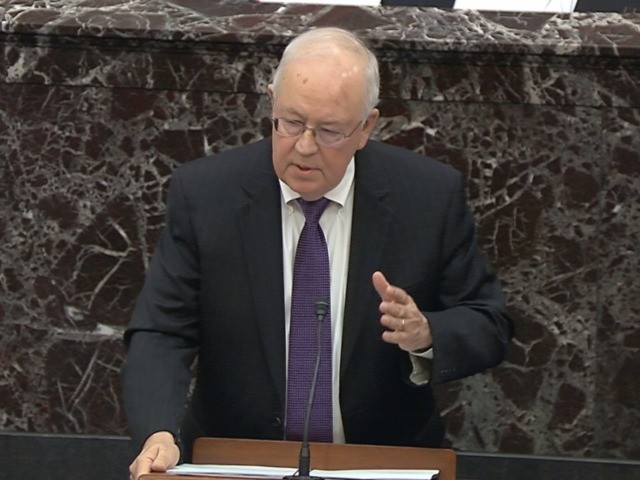Former independent counsel Kenneth Starr told the Senate impeachment trial Monday afternoon that President Donald Trump had been denied due process, and that the Senate should therefore oppose impeachment for that reason.
Starr, who led the investigation of President Bill Clinton that led to his impeachment, was the leadoff speaker for the White House as the president’s lawyers continued their opening arguments.
Starr began by warning that the country was entering an “Age of Impeachment” in which the House abused its power to impeach presidents of the opposing party over partisan differences.
He then noted that the “common law” of impeachment — the history and precedent for presidential impeachments — had always involved an allegation that the president had committed a crime. Here, there was no such allegation.
Starr then argued that President Trump had been in his rights to protect the powers of the presidency by rejecting unauthorized subpoenas by the House.
Presidential privileges such as the executive privilege, and the deliberative process privilege — “these are all firmly established in our law,” he said. “It there is a dispute between the people’s House and the President of the United States … and there is in each and every administration — then go to court.”
He noted that the Department of Justice frequently advised presidents not to submit to requests for documents and witnesses because of the importance of preserving the presidency and the Constitution’s separation of powers.
The House could have, he said, approached the courts to adjudicate its differences with the White House.
“Follow the path of the law. Go to court,” he said.
He then argued that the White House had been justified in rejecting subpoenas prior to an official House vote to launch an impeachment inquiry.
Starr argued that, “with all due respect to the Speaker of the House of the Representatives,” she was “powerless to do what she purported to do” under the Constitution by declaring an impeachment inquiry without a House vote. She was just one member among 435 — not empowered to take action for the whole.
President Trump, Starr noted, had followed the advice of the Department of Justice Office of Legal Counsel in his dealings with Congress. “He has been obedient” to its legal advice, he said. The president’s conduct “cannot reasonably be viewed as obstruction” and could not possibly be construed as an impeachable offense, Starr concluded.
He turned to history again, and noted that the House Judiciary Committee had rejected an article of impeachment against President Clinton for resisting subpoenas, even though many believed he had improperly claimed executive privilege.
The committee had “wisely concluded,” he said, that the president’s conduct, while improper, “should not be considered an impeachable offense.”
“It is not an impeachable offense for the President of the United States to defend the asserted legal and constitutional prerogatives of the presidency.”
The second article of impeachment, Starr concluded, indicated a “runaway House,” one that had departed from the Constitution’s principles of due process of law — principles enshrined since the Magna Carta.
Starr noted that the due process rights that the House denied to President Trump — such as the right to have counsel in impeachment inquiry hearings — were rights that had always been granted to accused presidents — “even to the racist Andrew Johnson, seeking to undo Mr. [Abraham] Lincoln’s great legacy.”
The House impeachment inquiry into President Trump, he said, had been “dripping with fundamental process violations.”
The fact that Trump’s rights had been violated went against the first purpose of the Constitution, he said, which was to “establish justice.”
“Courts would not allow this,” Starr said. “They knew, and they know, that the purpose of our founding instrument is to protect our liberties.”
Joel B. Pollak is Senior Editor-at-Large at Breitbart News. He earned an A.B. in Social Studies and Environmental Science and Public Policy from Harvard College, and a J.D. from Harvard Law School. He is a winner of the 2018 Robert Novak Journalism Alumni Fellowship. He is also the co-author of How Trump Won: The Inside Story of a Revolution, which is available from Regnery. Follow him on Twitter at @joelpollak.

COMMENTS
Please let us know if you're having issues with commenting.